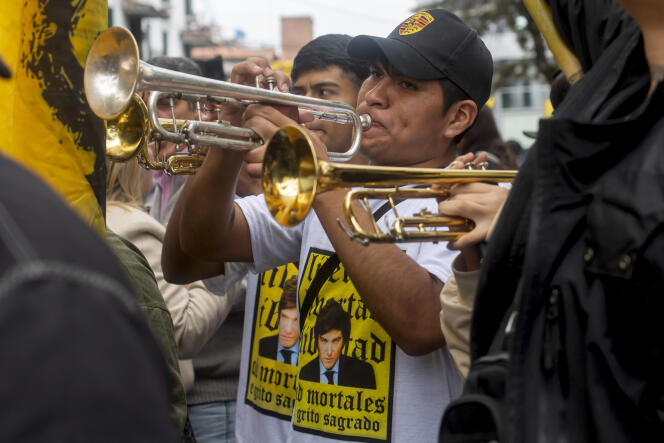Girls and boys scream like in front of a rock star, this Thursday, October 12, in the streets of Salta, the capital of the province of the same name, in the Argentinian northwest. When the ultraliberal Javier Milei, from the back of the pick-up that cuts through the crowd, begins to wave a backfiring chainsaw, symbol of what he intends to do with public spending and the State in general, the crowd chants : “The caste is afraid, Milei president! »
The far-right populist candidate, favorite in the polls for the first round of the presidential election on Sunday, October 22, owed this visit to Salta: coming in first during the primaries of August 13 – a mandatory ballot foreshadowing the presidential election – in 16 of the country’s 24 provinces, it is here, 1,500 kilometers from Buenos Aires, that the outsider obtained his most resounding victory, with 50% of the votes.
But it was even further away, 165 kilometers from Salta, in the middle of Puna – the Andean highlands – that Javier Milei, without ever having set foot there or put up the slightest poster, obtained his highest score, 63%, with a difference of 45 points with the candidate who came in second place, the Peronist Sergio Massa, current Minister of the Economy.
“We didn’t see Milei’s score coming, recognizes Alberto Carral, the (Peronist) mayor of San Antonio de los Cobres, a town of 7,000 inhabitants perched at 3,775 meters above sea level and capital of the Andes department. We were too confident. But now we are working hard to make Sergio Massa win. » In recent weeks, the councilor has gone door to door, distributing food baskets. “No one is fooled, people receive the package, but that’s not why they are going to change their vote,” slips an official who prefers to keep his name quiet.
Remove the peso
“The only one who campaigned here for the primaries was Milei, on social networks. The others did it the old-fashioned way, we didn’t see them. Sunday, I’m going to vote for him.” says Mario Soriano, a 22-year-old student. In the distance, on the bumpy road, a loaded truck passes. Every day, heavy trucks carry away gold, silver, borate and soon lithium from the mines surrounding San Antonio de los Cobres. “We are told that our region is rich, so why are we still so poor? “, sighs Mario. Villagers complain of not seeing the economic benefits of multinationals’ exploitation of all these resources.
You have 73.65% of this article left to read. The rest is reserved for subscribers.
